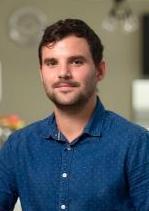
Associate Member
BSc [Sport and Exercise Science with industrial placement] (University of Bath, UK), PhD [Exercise Physiology] (University of Bath, UK), PhD [Neuroscience] (University of Bath, UK), Postdoctoral Research Fellowship [Physical Medicine and Rehabilitation] (Virginia Commonwealth University), Postdoctoral Research Fellowship [Rehabilitation Sciences] (University of British Columbia).
Research Interests
cerebrovascular function; neurocognitive function; Neuromodulation; NeuroprostheticsDr. Nightingale received his undergraduate degree at the University of Bath and worked as an Assistant Scientific Officer for the Occupational Medicine Department (Headquarters Army Recruiting and Training Division) at the Ministry of Defence during his industrial placement. He was awarded his PhD from the University of Bath in 2016 (Department for Health) and transitioned into a Research Associate position at the same institution. He moved to the USA to take up a Postdoctoral Research Fellowship in the Department of Physical Medicine and Rehabilitation at Virginia Commonwealth University, working out of the Spinal Cord Injury and Disorders Service at the Hunter Holmes McGuire Veteran Affairs Medical Center. He worked as a Postdoctoral Research Fellow in the Faculty of Medicine, Division of Physical Medicine and Rehabilitation at the University of British Columbia. During this time, he also worked as an external research collaborator at the Hennepin Healthcare Research Institute in Minneapolis on the ‘Epidural Stimulation After Neurologic Damage (E-STAND)’ clinical trial.
Dr. Nightingale’s research interests include:
- Measurement of physical activity energy expenditure in clinical populations (wheelchair users and lower limb amputees).
- Therapeutic interventions incorporating specific exercise paradigms and/or neuromodulation approaches to reduce cardiometabolic disease risk factors and secondary conditions associated with spinal cord injury.
- The cerebrovascular and neurocognitive consequences of aberrant blood pressure fluctuations following spinal cord injury.
His interests focus on the implementation of exercise rehabilitation strategies for individuals following a traumatic injury or acquired neurological condition, to minimize physical deconditioning and the ensuing development of chronic diseases. During his Postdoctoral Fellowship, supported by the Michael Smith Foundation for Health Research/ICORD and Djavad Mowafaghian Centre for Brain Health Innovation Fund trainee awards, his research involved the assessment of cerebrovascular health. Specifically, his research has attempted to understand the cerebrovascular consequences of autonomic dysregulation in individuals with a spinal cord injury. His research suggests that the use of neuroprosthetics, which delivers a targeted electrical stimulus to the spinal cord, can be successfully utilized to modulate key autonomic functions and improve exercise performance.
Recent publications
- Balthazaar, SJT, Nightingale, TE, Alrashidi, AA, Currie, KD, Krassioukov, AV. 2025. Effects of Exercise Interventions on Cardiac Structure, Function, and Mechanics in Individuals with Chronic Motor-Complete Spinal Cord Injury: An Exploratory Randomized Clinical Trial.. Top Spinal Cord Inj Rehabil. doi: 10.46292/sci24-00002.
- Farkas, GJ et al.. 2025. Cardiometabolic Risk in Chronic Spinal Cord Injury: A Systematic Review with Meta-Analysis and Temporal and Geographical Trends.. J Clin Med. doi: 10.3390/jcm14092872.
- Balthazaar, SJT et al.. 2025. 'Time is of the essence': upper-body aerobic exercise to improve cardiovascular health during inpatient rehabilitation within the first year following spinal cord injury - protocol for a randomised clinical trial.. BMJ Open. doi: 10.1136/bmjopen-2024-089868.
- Walter, M, Krassioukov, AV, Nightingale, TE. 2025. Managing autonomic dysreflexia during urological care in individuals living with spinal cord injury.. Nat Rev Urol. doi: 10.1038/s41585-025-01026-6.
- Hodgkiss, DD et al.. 2025. Short- and long-term effects of transcutaneous spinal cord stimulation on autonomic cardiovascular control and arm-crank exercise capacity in individuals with a spinal cord injury (STIMEX-SCI): study protocol.. BMJ Open. doi: 10.1136/bmjopen-2024-089756.

